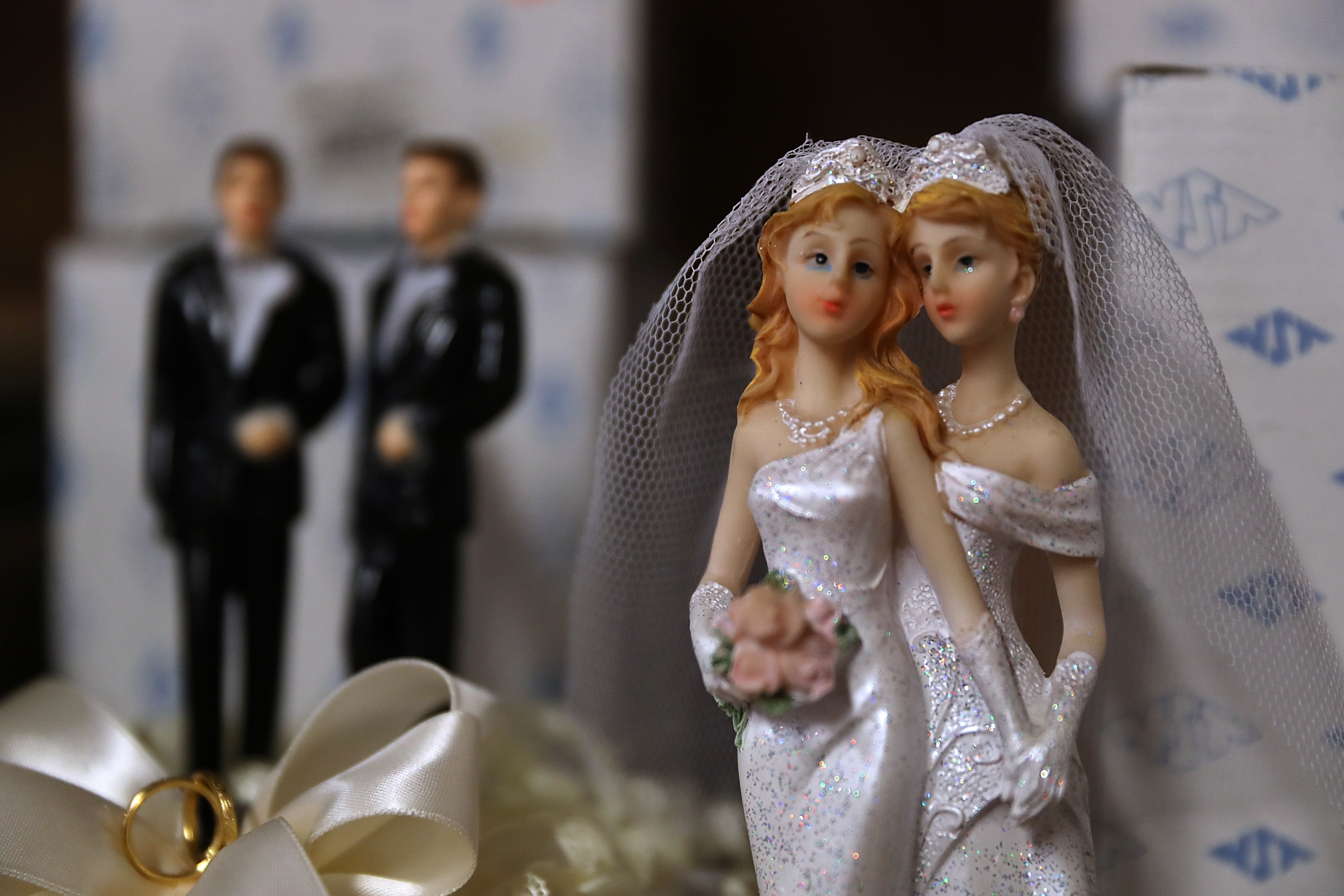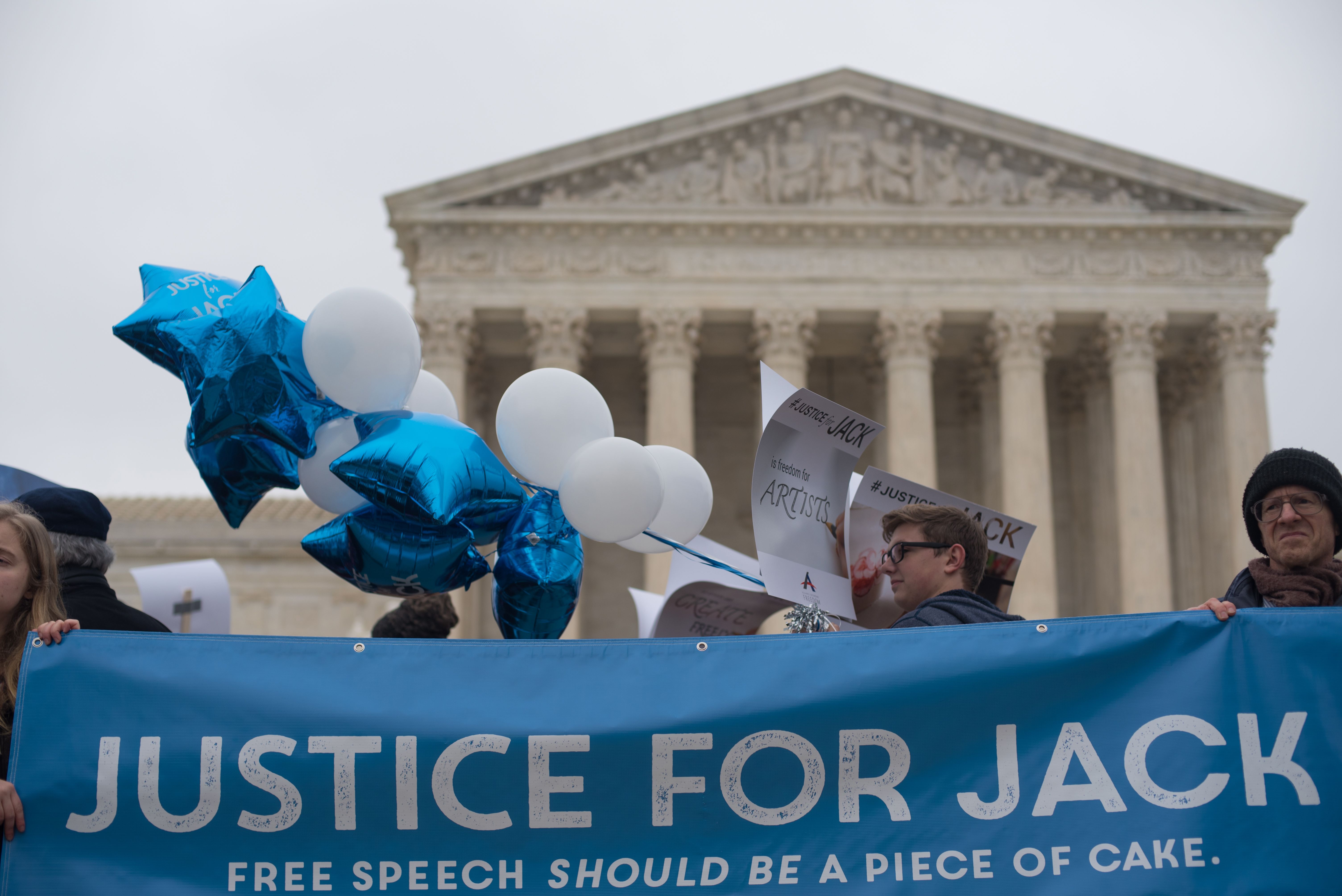A Christian wedding photographer in Virginia is challenging a recent state law that would force him to defy his religious beliefs about marriage or face hefty penalties.
Alliance Defending Freedom, the religious freedom legal group representing photographer Bob Updegrove, filed the case Monday night challenging the Virginia Values Act, which requires professionals to create content for same-sex weddings if they’re also creating content for weddings between a man and a woman.

SAN FRANCISCO, CA – DECEMBER 05: Same-sex marriage cake toppers are displayed on a shelf at Fantastico on December 5, 2017 in San Francisco, California. The U.S. Supreme Court is hearing a civil rights case over a Colorado baker’s refusal to make a wedding cake for a same-sex couple. (Photo by Justin Sullivan/Getty Images)
Updegrove captures photographs for churches, schools, businesses, and has photographed more than 300 weddings over the course of his career. Business owners who defy the law face up to $100,000 for each violation, according to Alliance Defending Freedom. The Virginia Values Act was approved by Democratic Gov. Ralph Northam and put into effect in July.
“Attorney General Mark Herring intends to use the law for creative professionals such as Updegrove to create and promote messages that violate their conscience,” ADF legal counsel Johannes Widmalm-Delphonse told the Daily Caller. “It also prevents religious organizations from hiring or operating consistent with their beliefs in different ways.”
ADF is also representing two churches, three schools, and a pregnancy center network in another case challenging the Virginia law for forcing nonprofit ministries to abandon their core convictions in hiring and other policies or face steep fines.
“We’ve seen in other states how these laws are used against people of faith. That’s what Attorney General Herring intends to do in this case, and so it’s important to challenge this law so [Updegrove] knows whether or not he can operate his business without fear of the fines and penalties this law spells out.”
ADF is also representing Chelsey Nelson, a wedding photographer in Louisville, Kentucky who filed a lawsuit in November challenging a law that forces her to promote same-sex wedding ceremonies against her religious beliefs. Because she photographs and blogs about weddings between one man and one woman, under the Louisville ordinance which is similar to the Virginia law, Nelson would also have to promote same-sex weddings to avoid being accused of discriminating between the two.(RELATED: Wedding Photographer Sues Louisville Over Law Forcing Her To Write In Favor Of Same-Sex Marriage)
The foundation for the cases echoes that of Masterpiece Cakeshop, which the Supreme Court ruled in favor of after an anti-discrimination law was ruled to not have been applies in a neutral manner. Jack Phillips, the owner of the shop, refused to bake a custom wedding cake for a gay couple due to his religious beliefs.

People rally for Jack Phillips, owner of Masterpiece Cake in Colorado, outside the US Supreme Court before Masterpiece Cakeshop vs. Colorado Civil Rights Commission is heard on December 5, 2017 in Washington, DC.
(MARI MATSURI/AFP via Getty Images)
Widmalm-Delphonse told the Caller that while it’s discouraging how many states keep passing laws that compel people to defy their convictions or face penalties by the state, every time a court considers these cases, they rule in favor of religious freedom.
“Even though the states have passed some of these laws targeting people of faith, the court pretty much uniformly has held that they can’t do that. You can’t force people to violate their conscience in this way.”
Because the courts usually rule in favor of religious freedom, Widmalm-Delphonse hopes Updegrove’s case doesn’t have to go to the Supreme Court for consideration, and ADF is focusing on the lower level courts to make sure the First Amendment is applied directly.
Widmalm-Delphonse emphasizes that religious freedom cases like Updegrove’s don’t only have implications for Christians, either.
“I think it’s important for people to understand that his law is bad for everyone. What we’re trying to do with this lawsuit is protect everyone’s freedom to promote messages that are consistent with their beliefs.”
“It doesn’t matter if you’re an atheist, a Jew, a Muslim, or Christian, everyone has beliefs and everyone wants to live a life consistent with those beliefs, so if you can make Bob Updegrove create photos that violate what he beliefs in, you can make anyone do that.”


